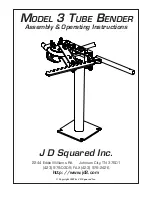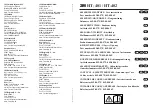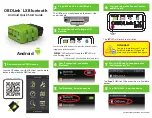
Field Installation & Test Procedure, 4 Sw itch Dual Antenna Arbitrator
Panel Assembly, Sea Tel TV
Page 1 of 7
Document No
99-145228-A2
Copyright © Sea Tel, Inc 2015 The information contained in this document is proprietary to Sea Tel, Inc.. This document
may not be reproduced or distributed in any form without prior written consent of Sea Tel, Inc.
1.1.
Dual Antenna Configuration
The basic premise for a dual antenna configuration is to provide un-interrupted TV services to the below decks
distribution system. In some vessel installations, clear view to all AZ bearings is not possible, which may be due
to blockage created by the vessels superstructure, masts or stacks. The theory in installing dual antennas is that
both antennas will be tracking the same satellite but only one antenna will be blocked at any given time. If
properly configured the Sea Tel antenna system will provide an output to an arbitrator when the antenna is
blocked, or goes into unwrap. The arbitrator will then route signals from the un-blocked antenna to the below
decks distribution. To avoid unnecessary switching, the arbitrator will only switch when the current “active”
antenna becomes blocked or goes into unwrap. Blockage/Unwrap are the primary conditions that will provide the
switching signal to the arbitrator. However, several other conditions which effectively make the antenna “not
available” can generate the signal as well: If the antenna:
•
Loses satellite signal
•
Loses Network ID (NID)
•
Has a pedestal stability error
1.2.
Installing the Antennas
Typically the two antennas are mounted with one on the port side of the vessel and the other on the starboard
side (ie left & right side of a mast). Another (less desirable) option would be with one a little forward of the mast
and the other aft of it. Both antennas will be installed per the instructions in the installation manual, HOWEVER,
to ensure that both antennas do not unwrap at the same time, align the “Secondary Antenna” with its’ BOW
marker to the Stern (or 180.0˚ from “Primary Antenna A”s’ orientation).
1.3.
Blockage Zone Plotting
For the arbitrator switching to work properly the blockage zones for each antenna must be programmed into its’
LMXP. Refer to the Blockage Zone information in the Installation Manual to determine the values to enter for up
to 4 blockage zones, for each antenna. The blockage zones will NOT be the same values for both antennas,
because the antennas are mounted in different locations. The blockage (also triggered by Unwrap) output from
each LMXP will allow the arbitrator to automatically route signals from the antenna which has good signal from
the satellite to the below decks & distribution equipment. Once properly configured, this configuration eliminates
the need for any operator intervention to maintain un-interrupted TV services.
1.4.
4 Sw itch Dual Antenna Arbitrator Panel Assembly (Sea Tel PN 33-145007-A)
NOTE: This document refers to your PRIMARY antenna system (Antenna and its’ LMXP), regardless of which
location (Port or Starboard) the antenna is mounted in. On power-up of the system, or on loss of power to the
Dual Antenna Arbitrator panel, the signals from the PRIMARY antenna will be routed to the below decks
distribution.
When the primary antenna is blocked, signals from the SECONDARY antenna (Antenna and its’ LMXP) will be
routed to the below decks distribution.
If both antenna systems are blocked, or un-blocked, the switches on this panel will remain in their previous state
(logic latched).
When the secondary antenna is blocked, signals from the primary antenna will again be routed to the below
decks distribution.




























